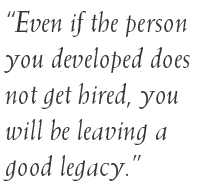GM Retirement Planning Best Practices, or How to Retire Gracefully
When a general manager (GM) is planning to retire, (as opposed to leaving the co-op for another job), the specific date of departure is flexible and known well in advance. The outgoing GM’s legacy will be affected by how s/he handles the transition.
Timing
Once you decide to take the leap, let your management team know that you’re planning to retire in the not-too-distant future without giving a specific date. For example, you might say in approximately 18 months you plan to retire.

Our experience shows us that hiring a general manager typically takes about 6 months. Therefore, we recommend announcing your retirement to the board with at least 6 months notice. There are two factors that could affect the timing of your announcement.
- If there is an expansion in the works, you would want to stay long enough to complete it or ensure that your replacement can successfully complete it.
- Ideally make the announcement shortly after a board election, to ensure that the board that starts the hiring process is the same group who will complete it.
The GM position can go from you to the next GM without needing an interim if you give the board 6 months notice and have some flexibility about the actual end date. That would be desirable because finding and designating an interim GM takes the board’s focus away from the GM search process.
Developing a successor
Before you tell anyone of your retirement plans or timeline, take an inventory of possible internal candidates on your team. The earlier you can identify these potential candidates, the more you may be able to provide additional training opportunities or project management experiences to help build their strengths, even before your plans are announced.

Inform the potential successor of your intentions but emphasize there are no guarantees that s/he will get the job. Explain that developing succession talent is an ongoing dynamic process that can be initiated or discontinued at any time and may involve more than one prospective successor. Also explain that the decision to hire the next GM will be up to the board. In fact, we recommend to boards that they recruit publicly for the GM position and consider internal candidates along with external candidates. In the event that an internal candidate is hired, an open hiring process builds greater support for her/him as the best possible choice for the job.
Inform the other management team members, too. They will likely guess that the person is being somehow favored, so it’s best to be open about it. Educate the team that this process is about cultivating the best possible candidate for the co-op and not about personal preferences.
Make a written assessment of your potential successor’s strengths and areas in need of improvement. Then give assignments to the potential successor so that s/he can deepen and broaden her/his skills, especially in the areas in need of improvement identified in your assessment. Examples of assignments include: leading task forces, researching other co-ops’ and non-co-ops’ practices, and making recommendations.
Take significant time off (a few different times) to give the successor time to manage the store in your absence. Then debrief on what s/he learned and where s/he needs to strengthen her/his skills. (Consider requesting an extra month of vacation in your compensation package during your last year to allow for this.)
Ensure that the successor attends all board meetings. Assign the writing of different monitoring reports to the successor (you remain accountable).
Budget funds for the successor’s development and provide adequate staff support for the successor to free her/him up from regular duties in order to take on assigned tasks. Set up a specific time schedule for successor to accomplish administrative tasks.
When you announce your retirement to the board, explain all the steps you have taken so far to develop a potential successor who the board will be able to consider along with other candidates the board may recruit. Emphasize that you and your successor want to see the board hire the very best GM they can find, not simply appoint the successor. Also, assure the board that if the prospective successor is not hired, s/he will fully support the new GM.
How is this different from the Emergency Management Successor called for by board policy? The emergency successor could be the same individual as the person you are developing for the GM position. But they don’t have to be the same person.
Even if the person you developed does not get hired, you will be leaving a good legacy by 1) ensuring that the co-op will have at least one qualified candidate, 2) giving a manager new skills so that s/he could become a GM at another co-op down the road.
Grab and Go Solutions is a resource from CDS Consulting Co-op to provide easy to implement solutions to common issues facing food co-ops. Watch for future releases tackling a wide variety of topics including HR, governance, member engagement, safety, store and growth.





Brought to you by CDS Consulting Co-op Human Resources Team Members
Carolee Colter, Melanie Reid, Sarah Dahl, and Jeanie Wells
with contributions from Mel Braverman and Thane Joyal
Have more questions?
Get in touch with one of our consultants.



